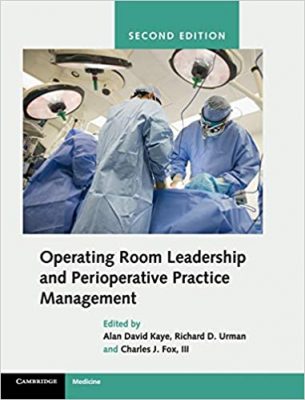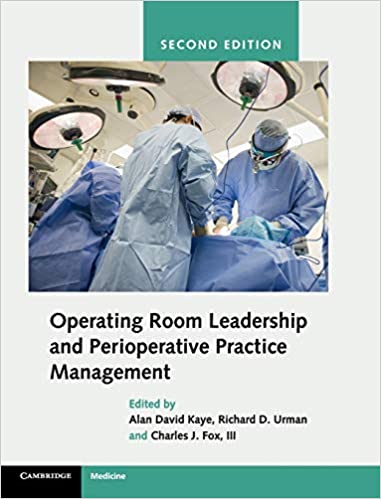 Editors: Alan David Kaye, MD; Richard D. Urman, MD; and Charles J. Fox III, MD
Editors: Alan David Kaye, MD; Richard D. Urman, MD; and Charles J. Fox III, MD
Managing Editor: Elyse M. Cornett, PhD
Publisher: Cambridge University Press – 376 pages
Book Review by: Nano Khilnani
This very wide-ranging book provides an extensive survey of all the matters and issues that need to be addressed and implemented when setting up a new operating room or enhancing an existing one, including providing a strategy of leadership for this facility, ensuing that it operates with economic viability, adequately managing it for optimum anesthesia service for surgeries, compassionate, professional, and highly-skilled nursing care, and very importantly, ensuring that the highest standards of safety are provided, along with state-of-the-art informatics and technology.
As we normally do based on what medical professionals advice us when we do reviews of books on all specialties of medicine and surgery, an outline of covered topics is provided:
- Section I – Leadership and Strategy
- Leadership Principles
- The Path to a Successful Operating Room Environment
- Strategic Planning
- Decision-Making: The Art and the Science
- Implications of Emotional intelligence and Collaboration for Operating Room Leadership and Management
- Operating Room Culture and Change
- Section II – Economic Considerations, Efficiency, and Design
- Flow Disruptions and Surgery
- Influence of Operating Room Staffing and Scheduling and Operating Room Productivity
- Operations Management and Financial Performance
- Re-engineering Operating Room Function
- Operating Room Design and Construction: technical; Consideration
- Operating an Ambulatory Surgery Center as a Successful Business
- Influence of Patient- and Procedure-Specific Factors on Operating Efficiency and Decision-Making
- Operating Room Management in the Perioperative Surgical Home and Other Future Care Models
- Non-Operating Room Locations
- Efficiency and Scheduling
- Operating Room Budgets: An Overview
- Section III – Surgical and Anesthesia Practice Management
- Perioperative Evaluation and Management
- Identifying Bottleneck Constraints to Improve the Preoperative Evaluation Process
- Anesthesia Practice management
- Defining the Anesthesia Value Proposition
- Anesthesia Billing, Coding, and Compliance
- Post-anesthesia Care Unit Management: Building a Safe and Service
- Pain Practice Management
- Office-Based Surgery Practice
- The Future of Perioperative Medicine
- Section IV – Nursing
- Operating Room Metrics
- Operating Room Staffing Guidelines
- Resource Management
- Section V – Safety, Standards, and Information Technology
- The Joint Commission, CMS, and Other Standards
- Procedural sedation: Clinical and Safety Considerations
- Medical Informatics in the Perioperative Period
- Simulation as a Tool to Improve Patient Safety
- Education in Operating Room Management
- Organizations Dedicated to, and Current Overview of Enhanced Recovery After Surgery
- Checklist Utility in the Perioperative Care Environment
- Anesthesiology Disaster Management and Disaster Preparedness
- Novel Technology for Patient Engagement
This is an excellent guide on the essentials of operating room leadership and management, organized by three superbly educated and experienced physicians, a competent hospital administrator and 72 contributors of content from all over the United States, too numerous to name here in this review.
Editors:
Alan David Kaye MD, a Rhodes Scholar state selection and national runner-up as an undergraduate, completed two B.S. degrees, one in Psychology and one in Biology, and his medical degree from the University of Arizona School of Medicine, along with a PhD in Pharmacology from the Tulane School of Medicine in 1997. He did his residency training at Harvard University’s Massachusetts General Hospital and at Tulane Medical Center, along with a Fellowship in Pain Management at Texas Tech Medical School in Lubbock.
He is triple board certified and for six years (1999-2005) served as Chairman and Professor o Anesthesiology at Texas Tech Medical Health Sciences Center and Professor of Pharmacology at Texas Tech Medical Center. In 2005, he became Chairman and Professor of the Department of Anesthesiology, Director of interventional Pain Medicine, and Professor of Pharmacology at the LSU School of Medicine in New Orleans. He is one of the most prolific publishers in the field of anesthesiology worldwide, is a noted book editor and national / international lecturer, is a member of the Anesthesia and Analgesics section of the Food and Drug Administration (FDA) and is the editor-in-chief of the highly regarded Journal Pain Physician.
Richard D. Urman MD is an anesthesiologist at the Brigham and Women’s Hospital (BWH) in Boston and Associate Professor of Anesthesia at Harvard Medical School. He serves as Chief of Anesthesia Services at the BWH Care Center in Chestnut Hill, and as Medical Director of Sedation for Interventional Medicine, where his responsibilities include overseeing all hospital sedation areas (adults and neonates), quality assurance, education and credentialing programs. He also serves as the Director of Anesthesia of the Interdepartmental Center for Perioperative Research at BWH and directs the newly established Perioperative Medicine Fellowship.
Dr. Urman received his MD from Harvard Medical School, MBA from Harvard Business School, and completed a residency in anesthesiology at Beth Israel Deaconess Medical Center (BIDMC) / Harvard Medical School. He is a Certified Physician Executive from the American Association for Physician Leadership (AAPL). Dr. Urman’s specialty interests include acute pain management, general and regional anesthesia, perioperative medicine and assessment, and sedation/anesthesia outside of the operating room. His research areas encompass informatics, novel anesthetic drugs, operating room management, patient outcomes and safety, and simulation. He has published over 250 peer-reviewed papers and numerous book chapters. He has also edited over 10 books.
Charles J. Fox III, MD is an anesthesiologist at Louisiana State University Health in Shreveport. He serves as Professor and Chair of the Department of Anesthesiology and President and CEO of the LSUHSC Faculty Group Practice Plan. He received his MD from LSUHC in New Orleans and completed his anesthesiology residency training at Yale New Haven Hospital and pediatric cardiac anesthesiology fellowship at the Children’s Hospital in Philadelphia. He helped publish the Tulane Department of Anesthesiology Perioperative Management Fellowship. He has published over 100 peer-reviewed papers, book chapters, and also edited over four books.
Managing Editor:
Elyse M. Cornett, PhD is affiliated with Louisiana State University Health in Shreveport.







